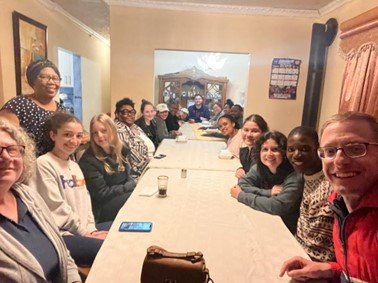Nelson Mandela: PhD student in Anthropology Mzoli Mavimbela was invited by Syracuse University, a private research university in New York, to deliver a public lecture to their students on the Gender-based violence (GBV) context in South Africa and the inclusion of students with disabilities in South African schools and universities.
The lecture was held as part of the Education and Inclusion in Post-Apartheid South Africa module presented at Rhodes University’s Summer School in Makhanda.
Mzoli was invited by Zuko Gqadavama of Makhanda’s Inkululeko Organisation and Professor Julia White from the Department of Teaching and Leadership at Syracuse University. Inkululeko supports students in Makhanda townships with the skills, support, and guidance necessary to apply, attend and succeed in university.
Gender-based violence is a profound and widespread problem in South Africa, impacting almost every aspect of life.
Mzoli, who is a social worker at Sanca in George, based his talk on the existing literature stating that GBV dates as far back as the 1600s when women in South Africa were enslaved.

He said that GBV (which disproportionately affects women and girls) is systemic and deeply entrenched in institutions, cultures, and traditions in South Africa and occurs because of normative role expectations and unequal power relationships between genders in society.
During apartheid, students with disabilities were excluded from the education system, and more than 80% were not in school. For those that had access to education, the system segregated them into ‘special schools’ and prevented them from meeting non-disabled students.
Post-1994 equity policies have largely focused on increasing the participation of Black students in higher education, and limited attention was paid to students with disabilities, who were individually accommodated rather than included.
There is, therefore, a need for radical inclusion, which is a strategy for making the social and learning contexts inclusive to all, Mvoli said.
Syracuse University students responded very well and mentioned that this is the case in Kenya, whereby students with special needs also face some challenges and that in Ethiopia, GBV is a huge issue.
“I also shared some of the practical cases that I have experienced in the line of my work as well as in the context of my rural upbringing, where we lacked access to resources, training and skills to help students with disabilities”, he said.
Mvoli is happy to have had the opportunity to lecture and hopes that in future, there will be more of these, as new postgraduates do not often get this chance.
